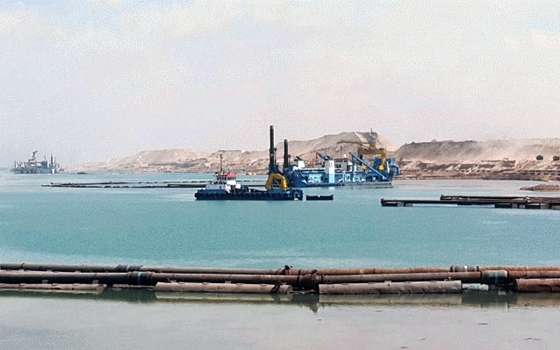Works on the $1.5 billion New Suez Canal project in Egypt have been completed and a successful trail run held on July 25, the UAE-based National Marine Dredging Company (NMDC) has said.
The successful navigation by ships in both directions comes ahead of the official inauguration of the expanded waterway on August 6.
As part of the trial run requirements, six container ships from around the world navigated the canal to ensure its readiness for full operations. Three ships navigated the canal from Suez in the south and moved northwards, while the remaining three sailed from Port Said in the North, towards the Red Sea in the south.
The massive expansion of the Suez Canal aims to enhance operational capabilities by allowing for the passage of larger vessels, reduce waiting periods and open up new revenue streams for the Egyptian economy.
NMDC was the leader of the Challenge Consortium which won the $1.5 billion contract for the project. The consortium included three of the world’s largest marine dredging companies – Boskalis and Van Oord from Netherlands and Jan de Nul from Belgium.
The construction works for the project included the digging of 35 kilometres of new waterway, to a depth of 24 metres and a width of 317 metres. The schedule of the project was further complicated by a directive from the Egyptian President, Abdel Fattah al-Sisi, which reduced the implementation period of the project from three years to one.
“To realize this formidable task in record time, we deployed 26 dredgers and 40 additional equipment – an unprecedented number to have been deployed in a single project within a tight schedule of less than 12 months,” said Engineer Yasser Zaghloul, CEO of NMDC and chairman of the Challenge Consortium.
“The short duration of the project meant speeding up the ground deployment and logistic works. The first dredgers arrived at the site and began work within two weeks after signing the contract, something unheard of in the history of deep excavation and dredging. Within record time, we commenced the project work which continued non-stop around the clock as we were racing against time to meet the deadline and leave our foot prints in modern Egypt's history.”
“Our biggest challenge was to implement the project in a short time frame of less than a year that required dredging of 1.5 million cubic meters every day – a huge rate as per any industry norm. During some months, we even outpaced the highest global record of eight million cubic meters per month through dredging more than 40 million cubic meters. The total amount of sand dredged in the project reached more than 200 million cubic meters, a formidable number by any industry standards,” he said.
MEConstruction
27 July























































